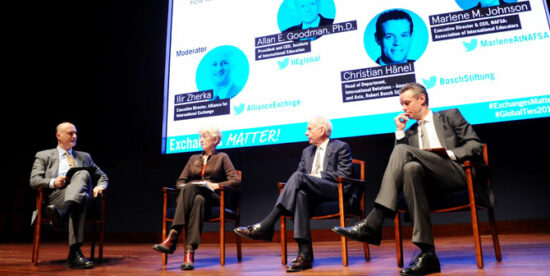
Decades ago, Mahatma Gandhi reminded us that “a nation’s culture resides in the hearts and in the soul of its people.” I like to think that the great Indian statesman and human rights activist would be content knowing that his philosophy has guided American international exchange programming for more than 75 years. Gandhi’s words are particularly noteworthy these days, as a maelstrom of voices urges us to view foreign nationals – and sometimes, our neighbors – as would-be terrorists whose interests and values are afoul of our own.
The philosophies of many great thinkers were on display at the Global Ties U.S. during Exchanges Matter! A Strategic Dialogue on Advancing Peace & Security through International Exchange Programs, which took place in the Congressional Auditorium of the landmark Capitol Visitors Center. A packed audience witnessed the fruition of over 75 years of commitment and hard work, seeing first-hand the depth to which international exchanges are woven into the fabric of the business sector and every branch of the U.S. Government.
Close to 450 participants—including members of Congress, administration officials, public diplomacy experts, members of the Global Ties Network and the wider international exchange community—engaged in broad discussions about programs both at home and abroad for students and professionals, their effects on economies and national security, and foreign policy. The event kicked off with the Congressional perspective. We heard about the value of exchanges from Congressman Jim Himes of Connecticut, who, with New Mexico’s Steve Pearce, founded the Congressional Caucus on International Exchange and Study. Joining the discussion was Congressman Jim McDermott, who talked about his experience as a Foreign Service Medical Officer stationed in sub-Saharan Africa. The former practicing physician discussed how he contributed to community health—and burnished America’s image—by working alongside local residents as they fabricated bricks from mud to build a schoolhouse and boiled drinking and bath water.
Moderator Diana Deem captivated many of us as she discussed how she convinced lawmakers to equate exchanges with America’s national security, noting “they improve global competitiveness; help [students] learn languages; and spur diplomatic and cultural understanding.” Diana discussed pitching the idea of a caucus to Texas Representative Mike Conaway, who quickly saw its value for young people in his district. As the caucus garnered support from throughout the political spectrum, Ed Royce, the Chair of the Foreign Affairs Committee, took notice and determined that he too needed to get onboard.
Lieutenant Governor Mary Taylor of Ohio was on hand to tell us that three of the Buckeye State’s sitting congressmen are former Fulbright Scholars. Ohio’s 29,000 secondary school-level foreign students contribute $1 billion to the local economy, she added. A Certified Public Accountant by profession, Ohio’s Lieutenant Governor talked about research showing that an increase in the percentage of foreign college students from 4.1% to 6% would generate an additional $1.2 billion dollars and support over 17,000 jobs in her state. Fixing the lag in retaining international students could support 1,000 new jobs and infuse Ohio’s economy with another $100 million, she added.
Everyone in attendance had the privilege of hearing seasoned exchange practitioners discuss the importance of bringing Americans and foreign nationals closer together. Among them: The Wall Street Journal’s Global Economics Editor Neil King, who interviewed Courtney Beale, the White House National Security Council’s Senior Director for Global Engagement. This White House staffer explained that the Obama Administration had realized the importance of having exchange and public diplomacy professionals seated at the conference tables where foreign policy initiatives where being ironed-out.
Ambassadors Kurt Volker and Barbara Stephenson joined Kristin Lord of IREX and Brigadier General Steven Cheney, USMC (Ret.) of the American Security Project for a discussion on the relationship between exchanges and security. Citing the link between military deployment and public diplomacy, Cheney, a retired Marine Corps general, noted that in any given year, 6,000 to 7,000 foreign military officers are studying in the United States. Upon their return to their home countries, “they understand where the United States is coming from,” he added. To make his point, General Cheney cited the case of a Russian admiral who telephoned an American student, also an admiral, whom he met on an exchange at Harvard, with an unusual request: could he convince the U.S. Navy to extract an entangled Russian submarine and rescue its crew, using equipment only the U.S. had? The answer of course was “yes.” As General Cheney showed us, exchange alumni can make the military’s job easier.
A panel discussion on exchanges and the private sector brought moderator and Alliance for International Exchange Executive Director Ilir Zherka into a discussion with NAFSA CEO Marlene Johnson, Institute of International Education President Allan Goodman, and Robert Bosch Foundation Vice President Christian Hanel. These interlocutors focused on the benefits to be gained by viewing foreign students as a resource to be retained by the states in which they obtain their education. Participants were then treated to an evening reception that featured Arkansas Senator John Boozman and State Department Assistant Secretary of State Evan Ryan.
Global Ties U.S.’ Strategic Dialogue on Advancing Peace & Security through International Exchange Programs also provided a roadmap outlining the direction international exchanges must take. As participants pointed out, members of the Global Ties Network need to build on existing relationships and create new ones with members of Congress in Washington, DC and in their home districts. As one speaker pointed out, “when politicians see an issue that resonates with voters, they will talk about it at townhalls and the other events, while discovering additional opportunities for their constituents.” “Foster these,” added the speaker, and “make sure they know who you are and what your organization does so they can get the excitement you generate.”
Interested in learning more? Watch Exchanges Matter! here.
By Robert Zimmerman, Global Ties U.S.
